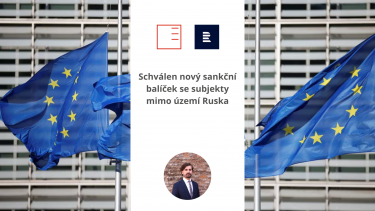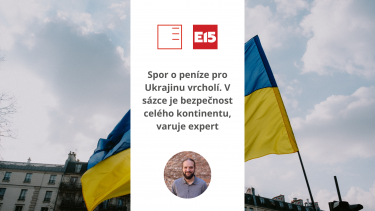ČRo | New sanctions package includes entities outside of Russia
The new thirteenth package of sanctions against Russia was approved today by representatives of the EU. The sanction list has been expanded by another 200 individuals, companies, and institutions. These include entities outside of Russia that are involved in bypassing measures preventing the purchase of military technologies by Moscow. An expert commentary for the Radiožurnál program was provided by EUROPEUM's deputy director Viktor Daněk.
Show morePrávo | Von der Leyen wants to continue leading the EU
As expected, Ursula von der Leyen has confirmed her interest in continuing as President of the European Commission. Since her arrival, she has faced crises such as Brexit, the global pandemic, the battle over vaccines and the Russian invasion of Ukraine. The announcement of her candidacy was analysed by Viktor Daněk, deputy director of the EUROPEUM institute, in Deník Právo.
Show moreČRo Plus | Another sanctions package against Russia
The foreign ministries of Germany, France, Sweden, Spain and the Netherlands have summoned Russian ambassadors over the death of opposition activist Alexei Navalnyj. Germany has proposed an approval of another sanctions package against Russia, while the last proposed package has not yet been approved. Martin Vokálek, Executive Director of EUROPEUM Institute, analysed how effective the sanctions are and whether Western countries should continue to push them.
Show more
MF DNES | Czech Republic abstained in the vote on the migration pact
The Czech Republic abstained in the vote on the EU migration pact, despite having promoted it so far and participated in its preparation. In addition to criticism of the bureaucratic burden, it may also be a strategic move ahead of the upcoming European Parliament elections. Our deputy director Viktor Daněk commented on the Czech Republic's position for the MF Dnes daily.
Show moreČRo Plus | Viktor Daněk: Pro-European Czech government and EU reform
Czech governments have always been strong supporters of EU enlargement, and the same is true of the current one. The cabinet of Petr Fiala of the ODS might even like to be seen as the one that has done the most of Czech governments for the accession of new members to the shared club so far.
Show moreTN.cz | The European Union approves the Migration Pact. Czech Republic abstained
EU Member States reached agreement on a migration pact to improve migration control and speed up the return of failed asylum seekers. The Czech Republic abstained in the vote and Prime Minister Petr Fiala has expressed concern about the proposed changes, which he says increase the administrative burden on states. Senior researcher Vít Havelka spoke to TN.cz about the issue.
Show more
ČRo Plus | EU leaders no longer let Orbán blackmail them. He has lost the battle, but he is already preparing for another one
At the summit, EU leaders agreed to release €50 billion to help Ukraine. After previous long resistance from Hungarian Prime Minister Viktor Orbán, the agreement was surprisingly quick. Viktor Daněk, Deputy Director of EUROPEUM, summarised the situation.
Show moreČRo Plus | What convinced Viktor Orbán to veto financial aid to Ukraine?
Listen to the interview with Žiga Faktor, deputy director and head of our Brussels office, about what convinced Viktor Orbán not to veto financial aid to Ukraine?
Show more
iDnes.cz | COMMENTARY: Quartet on the European budget - it is useless, isn't it?
Along with the discussion of the revision of the seven-year budget of the European Union (EU), statements that the budget is too big and unnecessary have once again appeared in the public space. Moreover, the EU is now borrowing to run itself because it is unable to make ends meet. It is worth recalling what the EU budget is for and why it is important to have one, writes Vít Havelka, a researcher at Europeum.
Show more
E15 | The dispute over money for Ukraine is coming to a head. The security of the whole continent is at stake, warns an expert
The presidents and heads of government of the European Union countries will try to secure additional financial and military aid to Ukraine in the amount of 50 billion euros (about 1.2 trillion crowns) at their extraordinary meeting starting on Thursday in Brussels. This has been blocked by Hungary since last December. Vít Havelka, a senior research fellow, answers why this summit could be a turning point.
Show more
Staroměstské náměstí 4/1
Prague 1 - Staré Město
110 00
tel.: +420 212 246 552
email: europeum@europeum.org
https://www.europeum.org









